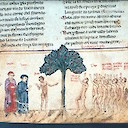Quant L'herba Fresq
Anderson sets Ezra Pound's translation of Ventadorn, re-deploying Ventadorn tunes.
Soprano Haleh Abghari, with the composer & Oren Fader
Ezra Pound's translation
When grass starts green and flowers rise
Aleaf in garden and in close
And philomel in dulcet cries
And lifted notes his heart bestows,
Joy I've in him and in the flowers joy,
E'en joy in me have I yet more employ,
Hath joy in her in whom my joy is cast,
She is such joy as hath all joys o'erpast.
I love her so and so her prize,
I fear her and such thoughts oppose
That my poor words dare not arise,
Nor speech nor deeds my heart disclose.
And yet she knows the depth of my annoy
And, when she will, she will her grace employ;
For God's love, Love, put now our love to test
For time goes by and we here waste his best.
the original occitan
Can l'erba fresch'e.lh folha par
e la flors boton'el verjan
e.l rossinhols autet e clar
leva sa vots e mou so chan,
joi ai de lui, e joi ai de la flor
e joi de me e de midons major;
daus totas partz sui de joi claus e sens,
mas sel es jois que totz autres jois vens.
Tan am midons e la tenh car,
e tan la dopt' e la reblan
c'anc de me no.lh auzi parlar,
ni re no.lh quer ni re no.lh man.
Pero elh sap mo mal e ma dolor,
e can li plai, mi fai be e onor,
e can li plai, eu m'en sofert ab mens,
per so c'a leis no.n avenha blastens.
S'eu saubés la gen enchantar,
mei enemic foran efan,
que ja us no saubra triar
ni dir re que.ns tornes a dan.
Adoncs sai eu que vira la gensor
e sos bels olhs e sa frescha color,
e baizera.lh la bocha en totz sens,
si que d'un mes i paregra lo sens.
Be la volgra sola trobar,
que dormis, o.n fezés semblan,
per qu'e.lh emblès un doutz baizar,
pus no valh tan qu'eu lo.lh deman.
Per Deu, domna, pauc esplecham d'amor;
vai s'en lo tems, e perdem lo melhor!
Parlar degram ab cubertz entresens,
e, pus no.ns val arditz, valgués nos gens!
Ai las! com mor de cossirar!
que manhtas vetz en cossir tan:
lairó m'en poirian portar
que re no sabria que.s fan.
Per Deu, Amors! be.m tròbas vensedor:
ab pauc d'amics e ses autre senhor.
Car una vetz tan midons no destrens
abans qu'eu fos del dezirer estens?
Messatger, vai, e no m'en prezes mens,
s'eu del anar vas midons sui temens.
translation of entire
(When the new vegetation and the leaves appear, when the flowers bloom on the branch, and when the nightingale clear and loud raises its voice and begins to sing, I rejoice in the nightingale, and in the flowers, and in myself, and most of all in my lady. I am surrounded by joy on all sides, but she is the joy from which all other joys come.
So much do I love my lady, and hold her dear, and so much do I fear and honor her, that I dare not talk to her of myself. I ask her nothing and I send her nothing. But still she knows of my pain and sorrow, and when it pleases her she bestows on me grace and honor, and when it pleases her I submit to even less so that no blame may come to her.
If I knew how to cast spells on people, my enemies would become babes, so that none of them could discover anything that could be turned against us. I know now that I will see my lady, and her fair eyes and fresh color, and I will kiss her on the mouth every which way, so that for a month the marks will be visible.
I would like to find her alone, sleeping, or pretending to sleep, so that I could steal a sweet kiss from her, since I am not worth so much that I could ask it of her. By God, lady, little do we profit from our love; time passes, and we are losing the best moments. We should speak in a coded language, and since audacity is worth little, may ingenuity be the thing.
Alas! I die from desire. For often, I am so full of yearning that theives could carry me off, and I wouldn't even realize what was happening. By God, Love! you find me Defeated (vensedor=Ventadorn), with few friends and without another master. Why don't you, once, ensnare my lady, before I am consumed with passion?)
The troubador poetry, with themes of love and war, can be ironic, as we see in Farai, but is it not utterly lacking in sentimentality of any kind, secular or religious? Is it not consistent with the heroic-age ethos--the world of Homer, but also the world of Hamlet's father, the opening of MacBeth....? It is poetry of fully enfranchised nobles, facing difficulty only with resistant love interests and warring factions.The poems that interest me have absolutely no Axial or Abrahamic moralizing.
And this poetry brings us to speculate about a continual frisson between naive and sentimenal poetry, with the unsentimental constantly re-emerging. Perhaps an early example is the ecphrasis in the Aeneid.
Vergil ––> troubadors ––> Dante ––> Petrarch? bits of Shakespeare ––> Sir Walter Scott ––> Goethe (of Götz von Berlichingen) ––> Ossian (MacPhearson) ––> Wagner (Pre-Raphaelites/Symbolistes) ––> Nietzsche's Also sprach Zarathustra ––> Ezra Pound/Arthur Waley/ imagism ––> Orson's Welles's Citizen Kane & Mr. Arkadin ––> ??
And again, I am tempted to think of all of the poetic traditions that assimilate the Axial & Abrahamic traditions as necessarily syncretistic, alway necessarily cognizant of primary, the heroic ethos?
In music, Adornal speaks of Bach's bad conscience regarding his homophony. I would not read Bach exactly that way, but I do agree with Adorno that species counterpoint is, in the composer's mind, hard & primary, while homophony feels like a softening. I propose we can call Charles Wuorinen a Pre-Paletrinite without fear.
In Bach's case, his double fugue in BWV 998 strikes me as a very deliberate conflation of homophony & the incarnation. The fugue moves from hard counterpoint to the homophonic sighing motives (what could be more *fleshly*!), and on to utterly homophonic figuration in the B section. I don't think this shows a bad conscience.








